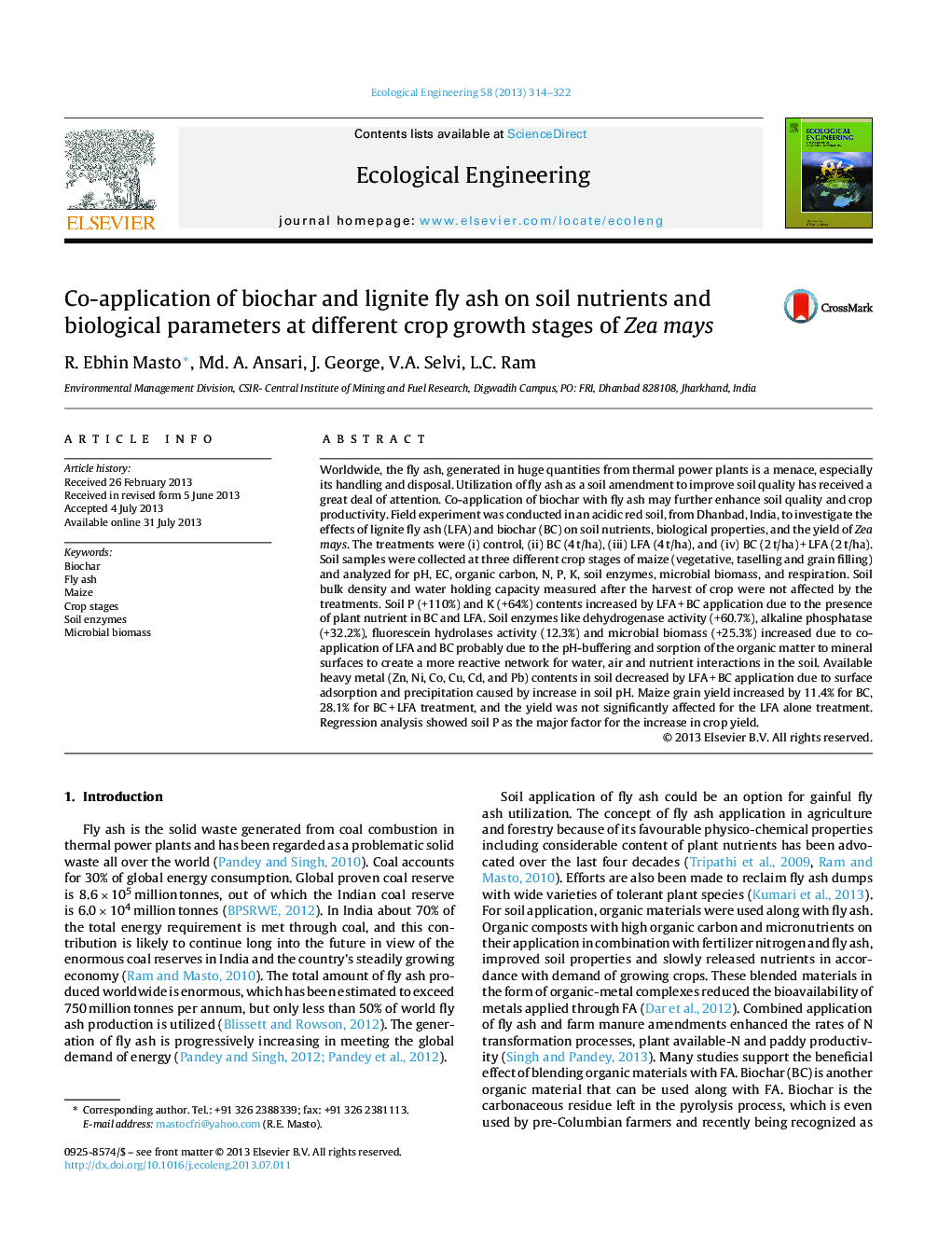| کد مقاله | کد نشریه | سال انتشار | مقاله انگلیسی | نسخه تمام متن |
|---|---|---|---|---|
| 6302539 | 1618040 | 2013 | 9 صفحه PDF | دانلود رایگان |
عنوان انگلیسی مقاله ISI
Co-application of biochar and lignite fly ash on soil nutrients and biological parameters at different crop growth stages of Zea mays
ترجمه فارسی عنوان
همکاری کاربرد خاکسترهای خاکستر زیست تخسه و لیگنیت بر مواد مغذی خاک و پارامترهای بیولوژیکی در مراحل مختلف رشد زعفران
دانلود مقاله + سفارش ترجمه
دانلود مقاله ISI انگلیسی
رایگان برای ایرانیان
کلمات کلیدی
موضوعات مرتبط
علوم زیستی و بیوفناوری
علوم کشاورزی و بیولوژیک
بوم شناسی، تکامل، رفتار و سامانه شناسی
چکیده انگلیسی
Worldwide, the fly ash, generated in huge quantities from thermal power plants is a menace, especially its handling and disposal. Utilization of fly ash as a soil amendment to improve soil quality has received a great deal of attention. Co-application of biochar with fly ash may further enhance soil quality and crop productivity. Field experiment was conducted in an acidic red soil, from Dhanbad, India, to investigate the effects of lignite fly ash (LFA) and biochar (BC) on soil nutrients, biological properties, and the yield of Zea mays. The treatments were (i) control, (ii) BC (4Â t/ha), (iii) LFA (4Â t/ha), and (iv) BC (2Â t/ha)Â +Â LFA (2Â t/ha). Soil samples were collected at three different crop stages of maize (vegetative, taselling and grain filling) and analyzed for pH, EC, organic carbon, N, P, K, soil enzymes, microbial biomass, and respiration. Soil bulk density and water holding capacity measured after the harvest of crop were not affected by the treatments. Soil P (+110%) and K (+64%) contents increased by LFAÂ +Â BC application due to the presence of plant nutrient in BC and LFA. Soil enzymes like dehydrogenase activity (+60.7%), alkaline phosphatase (+32.2%), fluorescein hydrolases activity (12.3%) and microbial biomass (+25.3%) increased due to co-application of LFA and BC probably due to the pH-buffering and sorption of the organic matter to mineral surfaces to create a more reactive network for water, air and nutrient interactions in the soil. Available heavy metal (Zn, Ni, Co, Cu, Cd, and Pb) contents in soil decreased by LFAÂ +Â BC application due to surface adsorption and precipitation caused by increase in soil pH. Maize grain yield increased by 11.4% for BC, 28.1% for BCÂ +Â LFA treatment, and the yield was not significantly affected for the LFA alone treatment. Regression analysis showed soil P as the major factor for the increase in crop yield.
ناشر
Database: Elsevier - ScienceDirect (ساینس دایرکت)
Journal: Ecological Engineering - Volume 58, September 2013, Pages 314-322
Journal: Ecological Engineering - Volume 58, September 2013, Pages 314-322
نویسندگان
R. Ebhin Masto, Md. A. Ansari, J. George, V.A. Selvi, L.C. Ram,
